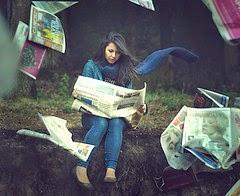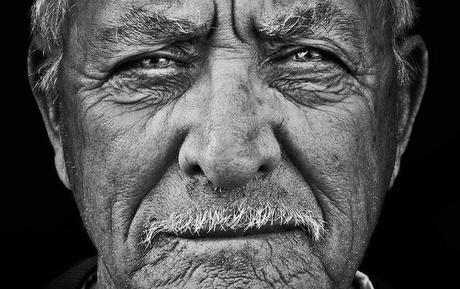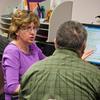
I see beauty in chaos in this photo by J.E.F.
Introduction to psychology courses nearly always include some attention to Maslow's hierarchy of needs.From the start of the life span, people usually master each of these needs in ascending order.
People establish physical needs, then social needs and finally more abstract needs, such as self-actualization.
As we age, however, we do not reduce our lives in order from the highest needs down to the most basic needs. Before I studied gerontology, I expected to see an orderly movement in reverse order as people age.
The aging process is more chaotic than I imagined.
Each person's aging process is unique to them. And even though some patterns in how people age might emerge in large studies, the aging process of just one person is largely unpredictable.
However, the more I interact with older adults, the more I observe how people can hold onto higher order tasks--spirit, beauty, knowledge and relationships--even as their bodies start to betray them.
Maslow's Hierarchy fails to serve as a model for the aging process.
People can live in the paradox of feeding higher order needs even when lower order needs are threatened or compromised.
The chaos and unpredictability of the aging process can produce anxiety in older adults and their loved ones--spouses, children, friends, clergy, neighbors, etc.

Photo from Wiki via Purple Slog.
Some seek to manage this anxiety by focusing primarily on a person's physical and safety needs and ignoring higher order accomplishments or higher order needs.They will sometime seek to limit a person's independence in the name of safety. I've done this.
Yes, safety is important. But it's not the only need people have as they age.
Nevertheless, I have observed an awkward dance between safety needs and higher order needs. This tension between safety and self-determination can cause quite a bit of pain for the older adult and their loved ones.
Sometimes much of this pain exists even within an individual: "Should I take that trip? Should I drive? Should I quit my volunteer work? Should I accept visitors?"
I would love to have a step-by-step guide. However, I'm finding that I have to support older adults "one day at a time." Admittedly, as a midlife woman, I'm having to think more about how to manage my physical limits against my goals for meeting my higher order needs.
Personally, I'm pairing my reading of nonfiction books about aging issues with reading of spiritual works such as zen Buddhist sayings.
For example, I have been (un)thinking about this quote for much of the week:

A map of the aging process by Kalani Odum.
"Zen is the unsymbolization of the world." R.H. Blyth.Which helps me to understand this quote:
"The map is not the territory." Alfred Korzbyski.
So despite spending 20 to 40 hours a week studying gerontology over the last 4 years, I really have no clear idea what the aging process will look like for my older relatives or for myself.
Sigh.
There is no one-size-fits all guidebook for managing the aging process. With all due respect, Maslow is a liar.

I see calm in the presence of chaos.
From a photo by Betty Nudler.
Related:
Individuals Often Defy Patterns
Transcending Age

